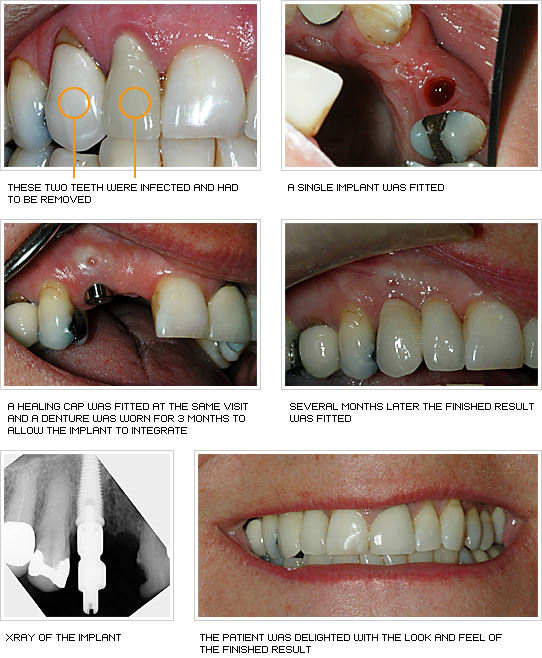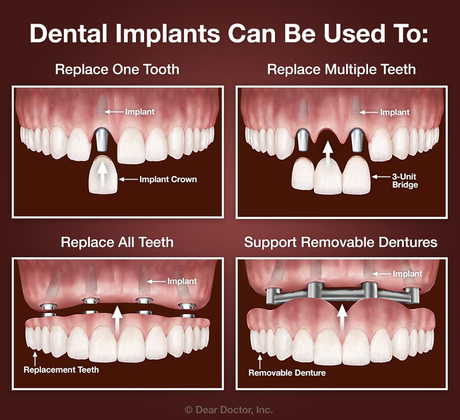What Does Dental Sense Mean?
What Does Dental Sense Mean?
Blog Article
The 2-Minute Rule for Dental Sense
Table of ContentsThe Best Guide To Dental SenseAn Unbiased View of Dental SenseWhat Does Dental Sense Mean?Some Known Factual Statements About Dental Sense
are clinical gadgets operatively implanted right into the jaw to bring back an individual's capacity to eat or their look. They supply support for artificial (phony) teeth, such as crowns, bridges, or dentures. When a tooth is lost as a result of injury or condition, an individual can experience difficulties such as fast bone loss, faulty speech, or adjustments to chewing patterns that lead to pain.Dental dental implant systems contain a dental implant body and dental implant abutment and might also include an abutment addiction screw. Kids dental. The dental implant body is operatively put in the jawbone in place of the tooth's origin. The oral implant abutment is typically affixed to the implant body by the abutment addiction screw and expands via gums right into the mouth to support the attached fabricated teeth
(https://myanimelist.net/profile/dentalsense1)Structure of The Dental Implant System selecting dental implants, speak with your dental company about the possible benefits and threats, and whether you are a candidate for the procedure. Points to take into consideration: Your general health is an essential consider determining whether you are a great prospect for dental implants, how long it will certainly take to recover, and how much time the implant might stay in place.
Smoking cigarettes may affect the recovery process and lower the long-lasting success of the implant. The healing procedure for the dental implant body might take a number of months or longer, throughout which time you usually have a short-term joint instead of the tooth. the dental implant treatment: Carefully adhere to the oral hygiene guidelines offered to you by your oral supplier.
Facts About Dental Sense Revealed
Implant failure can lead to the need for one more operation to take care of or replace the dental implant system. Recovers the capacity to eat Brings back aesthetic look Aids maintain the jawbone from reducing due to bone loss Protects the health and wellness of the bordering bone and gum tissues Assists keep adjacent (nearby) teeth secure Improves quality of life Damages to surrounding natural teeth during dental implant positioning Injury to the surrounding cells throughout surgical treatment, such as sinus opening Injury throughout surgery (for example, crack of surrounding jawbone) Inadequate feature, such as really feeling like the teeth do not attack with each other usually A sensation that the tooth is loose or twisting in position arising from an abutment screw loosening up Implant body failing (looseness of the implant body) as a result of systemic infection, which might be most likely in individuals with unrestrained diabetics issues as a result of regional infection in bone and gums supporting the implant body as a result of postponed healing, which may be more probable in clients that smoke Problem cleaning the gum tissues around the implant, causing bad oral health Unattended periodontal disease Post-surgical numbness because of nerve impingement or damage Constantly notify health treatment suppliers and imaging professionals that you have dental implants before any type of magnetic vibration imaging (MRI) or x-ray treatments.
FDA is not knowledgeable about any type of negative events reported for MRI or x-ray procedures with dental implants. Dental implants systems are normally constructed from materials that adhere to global agreement requirements of the International Organization for Standardization (ISO) or ASTM International. These requirements have information of what makes a risk-free material.

A dental implant is a framework that replaces a missing tooth. With screw-like tools, the specialist inserts an implant right into the jawbone, and it functions as a support for a man-made tooth, called a crown. A gadget called an abutment connects the man-made tooth to the oral implant. The crown is customized to fit the person's mouth and match the color of their teeth.
Some Of Dental Sense
Some people are not qualified for oral implant surgical procedure. It is for oral doctors to operate individuals with: acute illnessuncontrollable metabolic diseasebone or soft cells disease or infectionIf these problems are fixed, a person can have the surgery. In, oral doctors refrain from operating on individuals with: If people with any one of the above undergo dental implant surgical procedure, there is a higher threat of the dental implant falling short.

Oral implant surgical treatment is an individualized procedure. It's not the same for everybody. The adhering to provides a general overview of what you can expect your dental expert, dental specialist, periodontist or prosthodontist to do: Place the dental implant operatively. Give you time to heal. Attach the post and last crown, bridge or denture.
Next, Same day dental implants your surgeon will very carefully put the dental implant into your jaw. If your dental implant is near the front of your mouth, your dental expert will certainly make a short-term tooth for you to put on till you recover.
The smart Trick of Dental Sense That Nobody is Discussing
Your supplier can inform you what to anticipate in your circumstance. Throughout the healing phase, your jawbone needs to fuse to the oral implant. This procedure, called osseointegration, is important for stability and long-term success. This procedure can take anywhere from three to nine months. Sometimes, it may take much longer.
As soon as your dental implant heals, your dentist can attach the joint (small connector blog post) and your final repair (crown, bridge or denture). This normally takes concerning one hour to finish and may require a second minor surgical treatment. You shouldn't really feel any kind of pain during your dental implant treatment due to the fact that your supplier will make use of medication to numb your gums.
Report this page